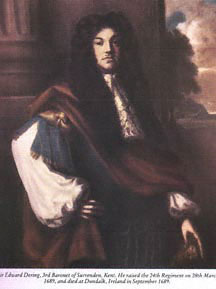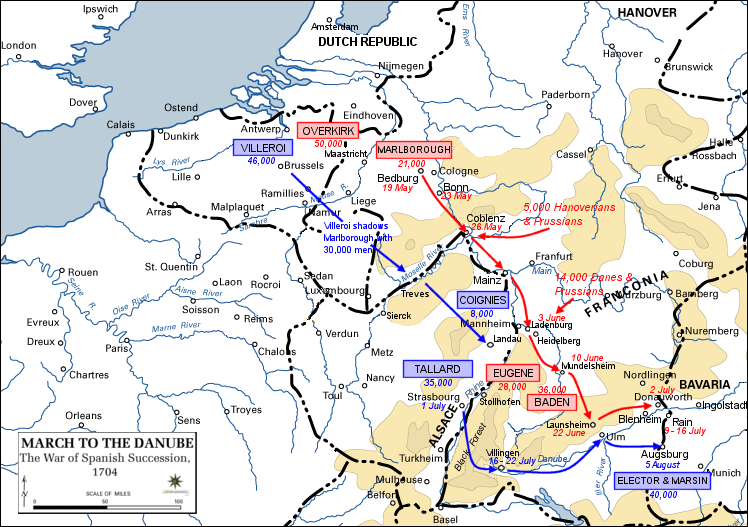|
24th Foot
The South Wales Borderers was a line infantry regiment of the British Army in existence for 280 years. It came into existence in England in 1689, as Sir Edward Dering's Regiment of Foot, and afterwards had a variety of names and headquarters. In 1782, it became the 24th Regiment of Foot, and had its depot in Warwickshire. Based at Brecon from 1873, the regiment recruited from the border counties of Brecknockshire, Monmouthshire, and Herefordshire. It was not called the South Wales Borderers until the Childers Reforms of 1881. The regiment served in a great many conflicts, including the American War of Independence, various conflicts in India, the Zulu War, Second Boer War, and World War I and World War II. In 1969 the regiment was amalgamated with the Welch Regiment to form the Royal Regiment of Wales. History Early history The regiment was formed by Sir Edward Dering, 3rd Baronet as Sir Edward Dering's Regiment of Foot in 1689, becoming known, like other regiments, by the ... [...More Info...] [...Related Items...] OR: [Wikipedia] [Google] [Baidu] |
Infantry
Infantry is a military specialization which engages in ground combat on foot. Infantry generally consists of light infantry, mountain infantry, motorized infantry & mechanized infantry, airborne infantry, air assault infantry, and marine infantry. Although disused in modern times, heavy infantry also commonly made up the bulk of many historic armies. Infantry, cavalry, and artillery have traditionally made up the core of the combat arms professions of various armies, with the infantry almost always comprising the largest portion of these forces. Etymology and terminology In English, use of the term ''infantry'' began about the 1570s, describing soldiers who march and fight on foot. The word derives from Middle French ''infanterie'', from older Italian (also Spanish) ''infanteria'' (foot soldiers too inexperienced for cavalry), from Latin '' īnfāns'' (without speech, newborn, foolish), from which English also gets '' infant''. The individual-soldier term ''infantry ... [...More Info...] [...Related Items...] OR: [Wikipedia] [Google] [Baidu] |
Second Boer War
The Second Boer War ( af, Tweede Vryheidsoorlog, , 11 October 189931 May 1902), also known as the Boer War, the Anglo–Boer War, or the South African War, was a conflict fought between the British Empire and the two Boer Republics (the South African Republic and the Orange Free State) over the Empire's influence in Southern Africa from 1899 to 1902. Following the discovery of gold deposits in the Boer republics, there was a large influx of "foreigners", mostly British from the Cape Colony. They were not permitted to have a vote, and were regarded as "unwelcome visitors", invaders, and they protested to the British authorities in the Cape. Negotiations failed and, in the opening stages of the war, the Boers launched successful attacks against British outposts before being pushed back by imperial reinforcements. Though the British swiftly occupied the Boer republics, numerous Boers refused to accept defeat and engaged in guerrilla warfare. Eventually, British scorched eart ... [...More Info...] [...Related Items...] OR: [Wikipedia] [Google] [Baidu] |
Battle Of Blenheim
The Battle of Blenheim (german: Zweite Schlacht bei Höchstädt, link=no; french: Bataille de Höchstädt, link=no; nl, Slag bij Blenheim, link=no) fought on , was a major battle of the War of the Spanish Succession. The overwhelming Allied victory ensured the safety of Vienna from the Franco-Bavarian army, thus preventing the collapse of the reconstituted Grand Alliance. Louis XIV of France sought to knock the Holy Roman Emperor, Leopold, out of the war by seizing Vienna, the Habsburg capital, and gain a favourable peace settlement. The dangers to Vienna were considerable: Maximilian II Emanuel, Elector of Bavaria, and Marshal Ferdinand de Marsin's forces in Bavaria threatened from the west, and Marshal Louis Joseph de Bourbon, duc de Vendôme's large army in northern Italy posed a serious danger with a potential offensive through the Brenner Pass. Vienna was also under pressure from Rákóczi's Hungarian revolt from its eastern approaches. Realising the danger, the Duke ... [...More Info...] [...Related Items...] OR: [Wikipedia] [Google] [Baidu] |
Battle Of Schellenberg
The Battle of Schellenberg, also known as the Battle of Donauwörth, was fought on 2 July 1704 during the War of the Spanish Succession. The engagement was part of the Duke of Marlborough's campaign to save the Habsburg capital of Vienna from a threatened advance by King Louis XIV's Franco-Bavarian forces ranged in southern Germany. Marlborough had commenced his march from Bedburg, near Cologne, on 19 May; within five weeks he had linked his forces with those of the Margrave of Baden, before continuing on to the river Danube. Once in southern Germany, the Allies' task was to induce Max Emanuel, the Elector of Bavaria, to abandon his allegiance to Louis XIV and rejoin the Grand Alliance; but to force the issue, the Allies first needed to secure a fortified bridgehead and magazine on the Danube, through which their supplies could cross to the south of the river into the heart of the Elector's lands. For this purpose, Marlborough selected the town of Donauwörth. Once the Elector ... [...More Info...] [...Related Items...] OR: [Wikipedia] [Google] [Baidu] |
Williamite War In Ireland
The Williamite War in Ireland (1688–1691; ga, Cogadh an Dá Rí, "war of the two kings"), was a conflict between Jacobite supporters of deposed monarch James II and Williamite supporters of his successor, William III. It is also called the Jacobite War in Ireland, Williamite Conquest of Ireland, or the Williamite–Jacobite War in Ireland. The proximate cause of the war was the Glorious Revolution of 1688, in which James, a Catholic, was overthrown as king of England, Ireland and Scotland and replaced by his Protestant daughter Mary and nephew and son-in-law William, ruling as joint monarchs. James's supporters initially retained control of Ireland, which he hoped to use as a base for a campaign to reclaim all three kingdoms. The conflict in Ireland also involved long-standing domestic issues of land ownership, religion and civic rights; most Irish Catholics supported James in the hope he would address their grievances. A small number of English and Scottish Catholics, an ... [...More Info...] [...Related Items...] OR: [Wikipedia] [Google] [Baidu] |
Frederick Schomberg, 1st Duke Of Schomberg
Friedrich Hermann von Schönberg, 1st Duke of Schomberg, 1st Count of Mertola, (french: Frédéric-Armand; pt, Armando Frederico; 6 December 1615 – 1 July 1690) was a Marshal of France and a General in the English and Portuguese Army. He was killed at the Battle of the Boyne in 1690. Early career Descended from an old family of the Electorate of the Palatinate, he was born at Heidelberg, the son of Count Hans Meinhard von Schönberg (1582–1616) and Anne, a daughter of Edward Sutton, 5th Baron Dudley, and Theodosia Harington. An orphan within a few months of his birth, he was educated by various family friends, among whom was Frederick V, Elector Palatine, in whose service his father had been. He began his military career under Frederick Henry, Prince of Orange, and in 1634 passed into the service of Sweden, entering that of France in 1635. His family, and the allied house of the Saxon Schönbergs, had already attained eminence in France with Henri de Schomberg and Charles ... [...More Info...] [...Related Items...] OR: [Wikipedia] [Google] [Baidu] |
Colonel
Colonel (abbreviated as Col., Col or COL) is a senior military officer rank used in many countries. It is also used in some police forces and paramilitary organizations. In the 17th, 18th and 19th centuries, a colonel was typically in charge of a regiment in an army. Modern usage varies greatly, and in some cases, the term is used as an honorific title that may have no direct relationship to military service. The rank of colonel is typically above the rank of lieutenant colonel. The rank above colonel is typically called brigadier, brigade general or brigadier general. In some smaller military forces, such as those of Monaco or the Vatican, colonel is the highest rank. Equivalent naval ranks may be called captain or ship-of-the-line captain. In the Commonwealth's air force ranking system, the equivalent rank is group captain. History and origins By the end of the late medieval period, a group of "companies" was referred to as a "column" of an army. According to Raymond Ol ... [...More Info...] [...Related Items...] OR: [Wikipedia] [Google] [Baidu] |
Sir Edward Dering, 3rd Baronet
Sir Edward Dering, 3rd Baronet (18 April 1650 – 15 October 1689) was an English Member of Parliament and baronet. He was the eldest son of Sir Edward Dering, 2nd Baronet of Surrenden Dering House in Pluckley, Kent and his wife Mary Harvey, a composer and niece of Dr. William Harvey. He succeeded his father in 1684. Like his father and grandfather before him, Dering served as an MP for the County of Kent; he sat in the last three parliaments of Charles II, between 1678/9 and 1681 (the Oxford Parliament). His father was still living, and MP for Hythe at the time, so the son was returned as Edward Dering Esq. Defeated in the 1689 election as the parliamentary candidate for Hythe, he instead raised a regiment of foot (later to become the 24th Regiment of Foot) and took it to Ireland to support King William III. There he fell ill and died at the age of 39. His body was brought home and buried in Pluckley. He had married Elizabeth, daughter of Sir William Cholmeley, 2nd Barone ... [...More Info...] [...Related Items...] OR: [Wikipedia] [Google] [Baidu] |
Plaque 24th
Plaque may refer to: Commemorations or awards * Commemorative plaque, a plate or tablet fixed to a wall to mark an event, person, etc. * Memorial Plaque (medallion), issued to next-of-kin of dead British military personnel after World War I * Plaquette, a small plaque in bronze or other materials Science and healthcare * Amyloid plaque * Atheroma or atheromatous plaque, a buildup of deposits within the wall of an artery * Dental plaque, a biofilm that builds up on teeth * A broad papule, a type of cutaneous condition * Pleural plaque, associated with mesothelioma, cancer often caused by exposure to asbestos * Senile plaques, an extracellular protein deposit in the brain implicated in Alzheimer's disease * Skin plaque, a plateau-like lesion that is greater in its diameter than in its depth * Viral plaque, a visible structure formed by virus propagation within a cell culture Other uses * Plaque, a rectangular casino token See also * * * Builder's plate * Plac (disambiguatio ... [...More Info...] [...Related Items...] OR: [Wikipedia] [Google] [Baidu] |
Royal Regiment Of Wales
The Royal Regiment of Wales (24th/41st Foot) was an infantry regiment of the British Army, part of the Prince of Wales' Division. It was formed in 1969 by the amalgamation of the South Wales Borderers and the Welch Regiment. The 1st Battalion, The Royal Regiment of Wales (24th/41st Foot) had a short existence in military terms, just over 36 years. Within two months of amalgamation, the battalion was one of the first units to be deployed to Northern Ireland. History The regiment was formed in 1969 by the amalgamation of the South Wales Borderers and the Welch Regiment. The then Prince Charles was appointed Colonel-in-Chief of the new regiment in early 1969, his first Army appointment. The amalgamation parade of the two regiments took place in Cardiff Castle in early 1969, in front of the then Prince Charles. In August 1969 units of the 1st Battalion the Royal Regiment of Wales became the first British troops to be deployed in Belfast with A & B companies taking control of the L ... [...More Info...] [...Related Items...] OR: [Wikipedia] [Google] [Baidu] |



.jpg)


